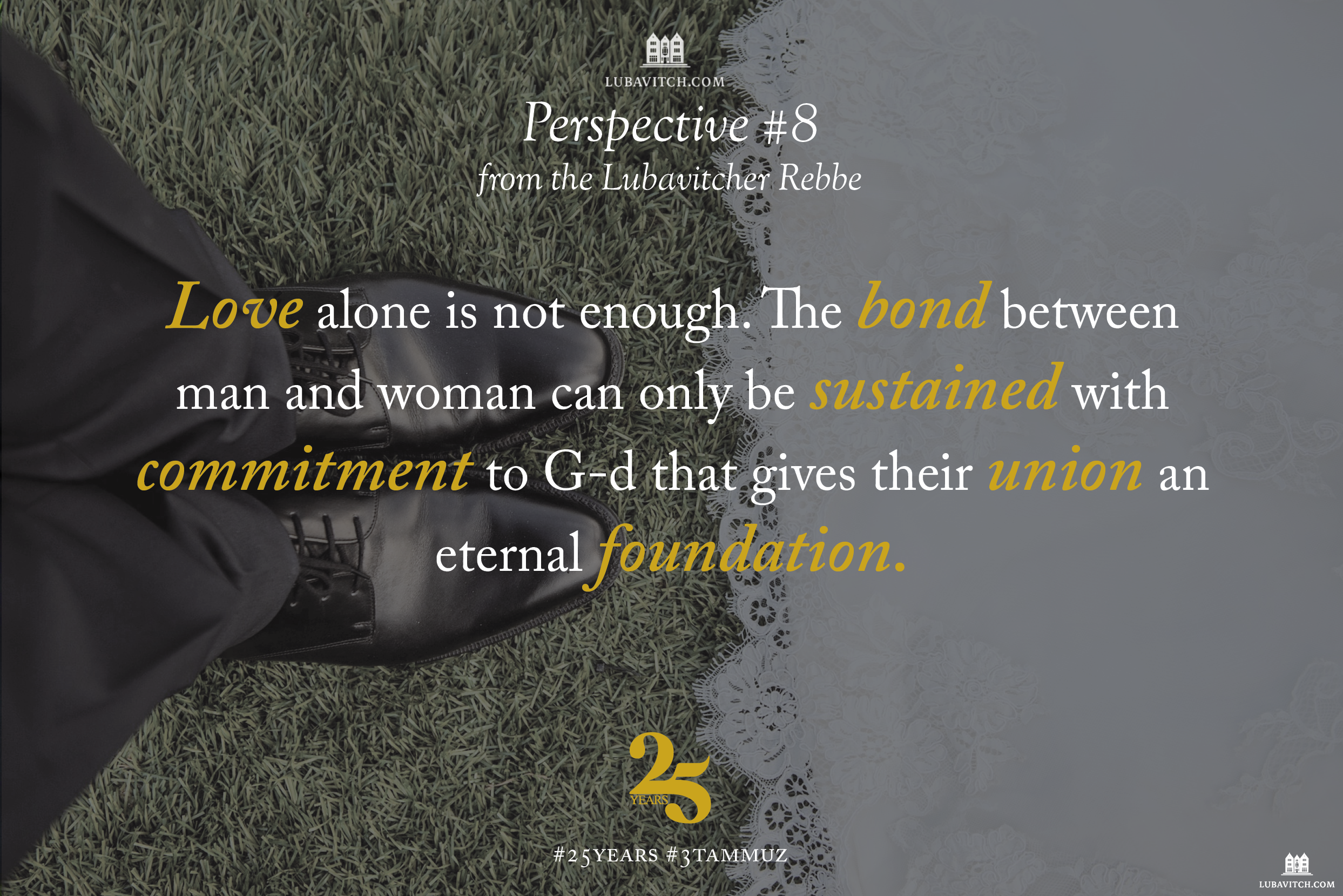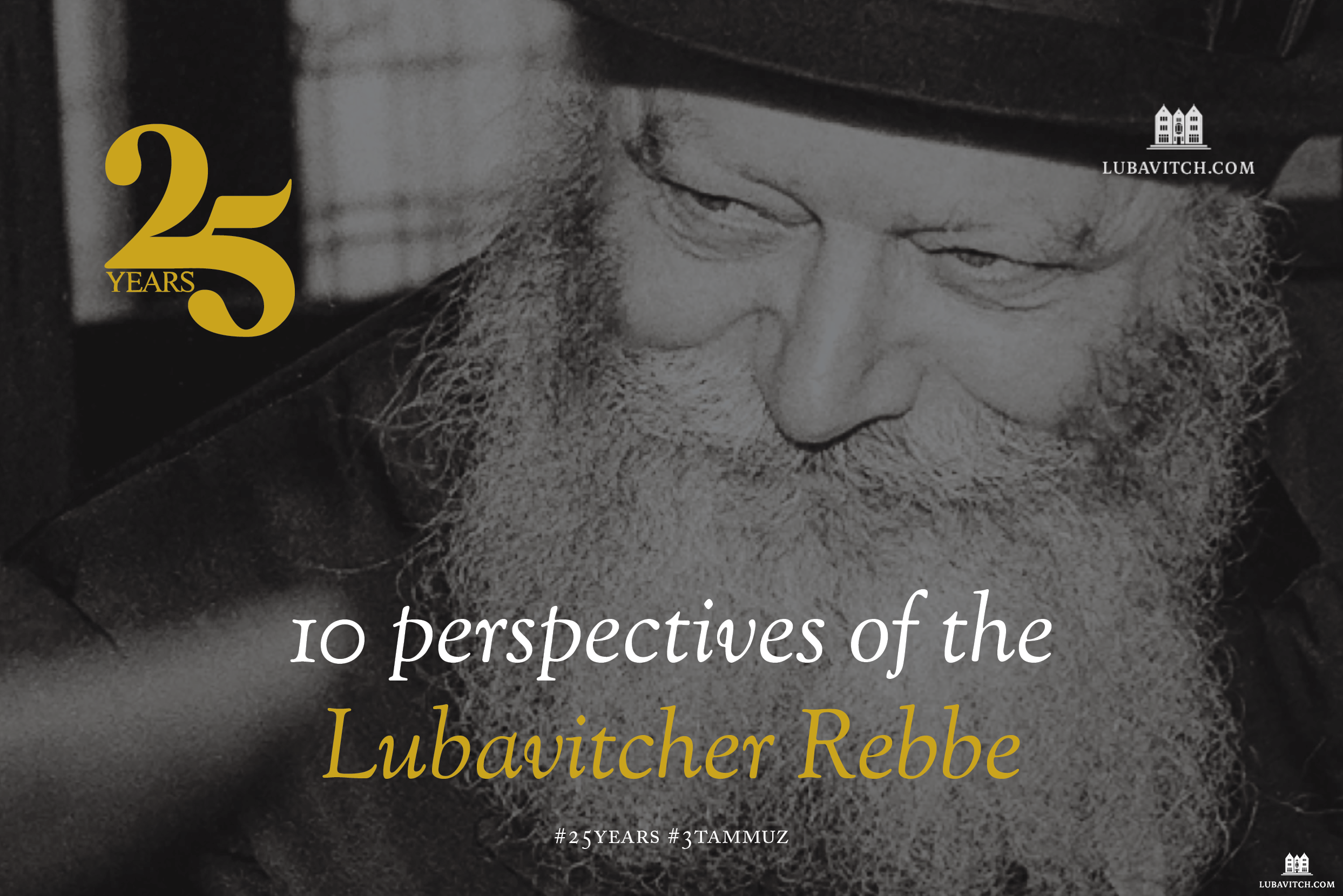Ten perspectives for present-day living, in the words of the Lubavitcher Rebbe, garnered from the extensive collection of his talks, writings and in-person conversations.
#1 Social Responsibility
Who comes first: myself or the society I live in?
Primarily we must live the life of social beings with responsibility and dedication for our best efforts for the community. Only then can we afford to invest in our own individual aims and goals.
#2 Power of the Individual
But I’m just one person, how can I affect the world?
People often perceive themselves in terms of their constraints as mortal beings. Yet there are times that are called for transcendent actions, one must at times do more than they can possibly do. For each mortal is endowed with a G-dly soul and G-d transcends mortal constraints.
#3 The Handicapped are Exceptional
What about people who are handicapped, what is their role?
I strongly recommend a change in the word handicapped and prefer the term “outstanding” or “excellent ones”, for it is their excellence that enables them to transcend whatever physical limitations they may have.
#4 The Elderly in 2019
What is the role of the elderly in society?
Ours is a society in which one’s value is often measured in terms of physical strength. The Torah perspective holds the elderly in high esteem. It is with age and experience of life that one gains wisdom. It is for this reason the elderly must occupy and utilize their mental faculties and aspire to greater spiritual growth. I advocate the establishment of learning institutions for the elderly for this express purpose.
#5 Being Present
How do we identify our life’s mission?
If you see what needs to be repaired and know how to repair it, then you have found a piece of the world that G-d has left you to perfect. But if you only see what is wrong and what is ugly, then it is you yourself that needs repairing.
#6 Incarceration is Pointless
Should we be putting people in prison?
Nowhere does the Torah advocate incarceration as a form of punishment.
As a prisoner one is denied the freedom to fulfill his Divinely ordained mission, hence his reason for living.
As a prisoner one is denied the freedom to fulfill his Divinely ordained mission, hence his reason for living.
To allow one to live and then deprive him of living is inhumane.
#7 Investing in Children
How should I parent?
Contrary to conventional perspective which regards children as potential human beings who do not reach their full worth until maturity, Jewish tradition perceives children as worthy and deserving of our greatest resources of time and energy to create an environment that is both physically and spiritually nurturing, for it is the children who embody the purity of intent, sincerity, faith and enthusiasm for life.
In America, most parents, however well-intentioned, have been more concerned about the children’s material, rather than spiritual well-being.
They are primarily interested in providing their kids with careers and professions and other means of economic security, leaving it to their children to find their own way in regard to such things as religion or outlook.
The bankruptcy of ideals and ideologies have left many young people terribly disillusioned, morally and spiritually. A void is created in their hearts and minds which they do not know how to fill.
#8 Marriage Is Something G-dly
Is love enough?
Love alone is not enough to sustain an eternal bond between a man and a woman. It is their commitment to G-d and the dedication of their lives to the eternal values that give their union an eternal foundation upon which to thrive.
#9 Education Is About Character
What should I teach?
Education that is merely concerned with the transmission of information is doomed to failure. It must serve a more noble purpose of cultivating a student’s moral character.
The development of a student’s math skills, knowledge of history, science, etc., cannot be divorced from their growth as a well-functioning and productive member of society.
#10 Charity Is Not Kind
Why give of something I worked hard for?
The giving of charity is a life-sustaining act—one that allows us to imitate G-d, the animator of the living.
One is fulfilling his/her obligation and giving not of one’s own. But that which has been entrusted by G-d, to that individual to give to others.

Vivi Frances
I love reading the Rebbe’s quotes. Thank you.
Esther
Thank you!! 😄